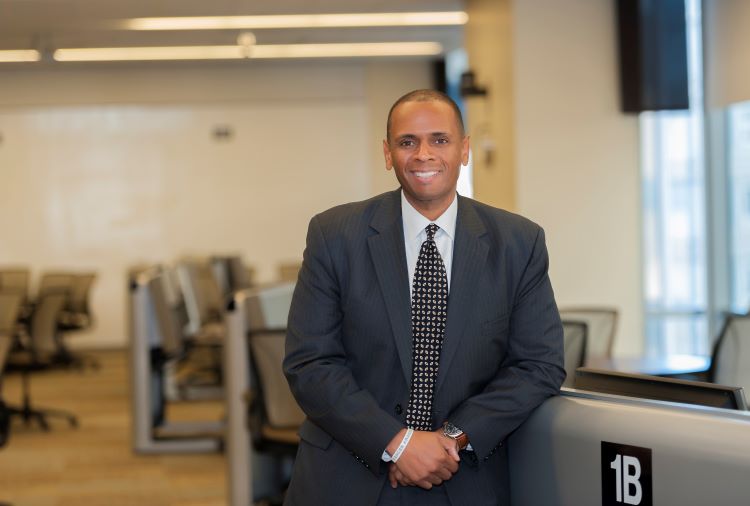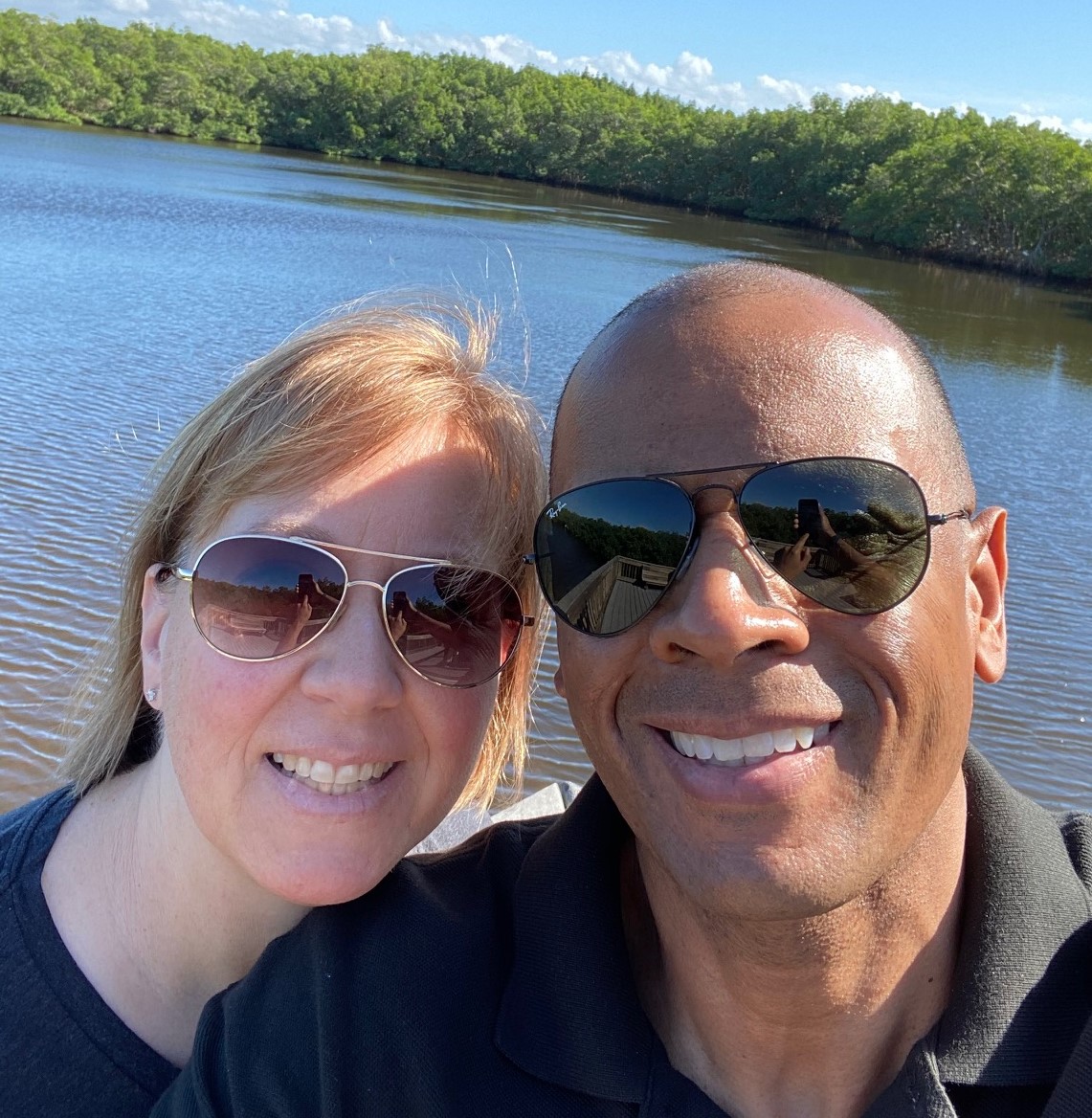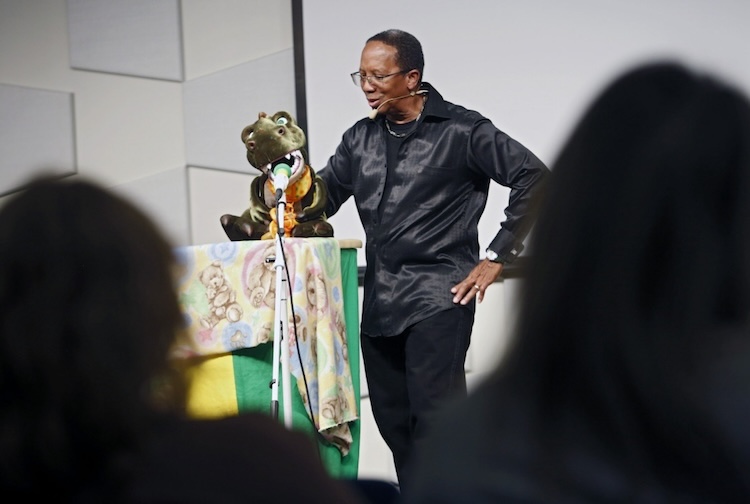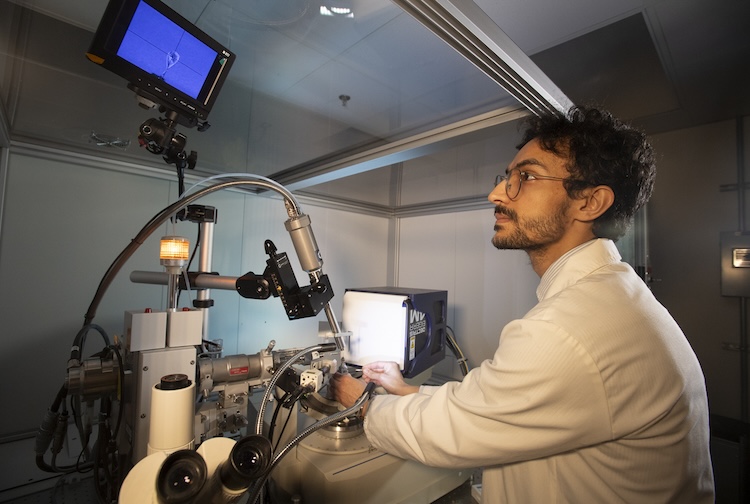
‘Find your resilience’: Patrick Nana-Sinkam talks about his career in medicine and training the next generation in challenging times
As part of Global Diversity Awareness Month, Dr. Nana-Sinkam shares his unique perspectives.
October 27, 2020
Patrick Nana-Sinkam, M.D., grew up wanting to be a filmmaker.
Inspired by classic films that his mother introduced him to, the chair of the Division of Pulmonary Disease and Critical Care at VCU Health thought about applying to film school. But an opportunity to volunteer at a clinic during college changed his course.
Now a professor in the Department of Internal Medicine at VCU School of Medicine, an associate director for KL2 career development and mentoring at the VCU Wright Center for Clinical and Translational Research, and a member of VCU Massey Cancer Center's Cancer Prevention and Control research program, Nana-Sinkam answered questions about his career as a physician and scientist.
What drew you to pursuing medicine as a career?
I didn’t set out to be a physician. I wanted to make films. I recall being five years old and my mom taking my brother and me to see these old, silent movies, Charlie Chaplin films, that would play in the local movie theater in Reston, Virginia. I gained an enormous appreciation for film. I was going to apply to film school in New York.
My parents immigrated to the United States when I was very young and always wanted me to become a physician. They would say, ‘You have the right temperament, the right personality for it.’ And I resisted like a typical teenager. But when I was in college, I had the opportunity to do some volunteer work in a primary care physician’s office. It was almost like a light bulb went off. It dawned on me that medicine is one of the few vocations where you develop this unique relationship with people. Someone instills their trust in you, shares some of the most intimate details of their lives. They place their health in your hands. I started watching how physicians would develop these close relationships. And I said, you know what? I think this is really what I want to do.
It wasn't initially a fascination with science. For some people who go into medicine, the spark is science. Sometimes the spark is, 'I want to make people feel better. I want to cure disease.’ And I do care about those things, but it was really about this relationship, forming this bond with another person, that drove me to medicine.
Why did you come to VCU four years ago?

Dr. Nana-Sinkam and his wife
The patient is central to my clinical practice and research. And it was apparent during my first visit that VCU shared that core value. VCU is at the cutting edge in terms of research and medical education, but we never lose focus on our patients. As we commit ourselves to educating the next generation of physicians, training the next generation of scientists, moving the needle forward in terms of scientific knowledge, what's at the center of it? It's our patients.
The second reason is the partnership with the community. VCU makes a concerted effort to partner with the community. The days of paternalistic or maternalistic medicine, where the physician tells the patient, ‘this is what you’re going to do,’ have long passed. That's not what medicine's about anymore. Medicine is about partnership. Patients are more educated and more health literate than they ever have been. Medicine is more complex than it ever has been. So that partnership is absolutely essential to establishing trust and effective health care.
What led you beyond clinical work into medical research?
I've always been a curious person by nature. As a child, I was always asking why – why this, why that. And that’s stayed the case as I became a physician. Why did this particular disease affect this patient one way and that patient another way? Why did two patients with the same cancer respond very differently to the same therapy? I often came home from the clinics with more questions than answers.
As a third year medical student, I started engaging in some research in the laboratory – very simple, uncomplicated research. But I caught that “fire in the belly” for research, which stayed through my residency, through my fellowship. If anything, the fire grew even more as I went through my training, because the questions that I would ask myself became more complex.
As I've become more experienced in medicine, I say 'I don't know' more than I did when I first started. I'm realizing how complicated medicine is and how much there is that we still don't understand. That’s what drove me to research. I wanted to take what I know clinically and start trying to answer some of these questions.
Did you face any challenges or misconceptions on your journey to where you are now?
As I was going through my training, there were very few people who looked like me. There were very few black males who were in pulmonary and critical care medicine, who were competing for NIH funding and who were physician-scientists. At times, I was met with people who challenged my commitment, who challenged my ability to do all this. There were times where the lows were quite low during my journey. There were times where I questioned my own resilience in this journey.
What came of that was an increasing appreciation for a diverse workforce in medicine and in research. It only makes us better.
Why is it important that there be diversity in the people who conduct medical research?
The population of patients that we serve are increasingly diverse. And they're diverse across many lines – race and ethnicity, gender. We’re also caring for a growing elderly population of patients. These groups have many, distinct variables that drive their disease or impair their health. The clinical and research workforce should represent the population for whom we care.
It's no secret that a person's health is driven by so many factors: socio-demographic factors, genetic factors, epigenetic factors, i.e. environmental influences on their health. It’s important that the workforce that cares for these patients, that attempts to understand disease in these patients with the goal of identifying cures, be one with a true appreciation for all of those variables, based in part on their own experiences and their own background.
What has this year highlighted for you when it comes to diversity in health care?
Without sounding cliché, we are living in very unique times. We are living in an intersection of multiple pandemics — a pandemic of social inequity, a pandemic of health inequities and a pandemic, of course, of COVID-19 — all at the same time.
That intersection has highlighted real inadequacies in the health care system. We have always known that there are patients who simply do not have the ability to receive proper health care. They have financial obstacles, transportation obstacles, a lack of access to broadband. They are even more isolated from the health care system now.
The second thing that is magnified now is the fact that not everyone receives the same health care. That was obvious, but this particular pandemic has further highlighted the fact that there are major inequities in health care delivery in this country that have to be addressed. Public policy and health care should go hand-in-hand.
Has any of this changed how you advise young and aspiring doctors and medical researchers?
What I tell my mentees, particularly the younger ones, is: 'You have a unique opportunity to take the lead at a time where we need more leaders.' And I'm not talking about political leaders necessarily. I'm talking about leaders in medicine. You can lead, regardless of what your title is. You don't have to have four different degrees, and you don't have to have salt and pepper hair. You can lead in your own way.
I tell my mentees: Find a way to be involved. This is your time. I'm here to help, but it's not my time. You’re sitting at the forefront of a significant change in health care over the next 10, 15, 20 years. You have an opportunity to really shape the future for folks like me, who in 20 years will be retired. I'm going to be that older person who is looking to the system for care.
The other thing that I tell them is, because of this intersection of all of these various pandemics, you need to remind yourself what is important to you — your family, friends, your passions outside of medicine. You have to hold onto those. They're incredibly important. Don't lose sight of them.
The third thing is, you have to dig deep inside and find your resilience. This is a time that has asked so much of so many of us. People are tired. There's a malaise in the country. It's been a hard eight months. But it’s important that our young scientists and clinicians and nurses and social workers dig deep and find that resilience and know that we are going to come out of this on the backend. They have to find that positivity and that resilience to support one another and lead.
It's a marathon, not a sprint.
How do you train up-and-coming researchers to engage with the community?
It's a simple answer, but what I advise them is: face time.
Find opportunities to go into the community. Look for venues where you have an opportunity to present your work or to present a topic where you have emerging expertise. You can't always expect the community to come to you.
Secondly, you have to learn how to communicate with the community. There is the scientific talk in the big academic center where the audience is full of scientists. And there are conversations in the community — speaking with your patients, with community health workers, with community advocates. You have to learn to communicate with everyone.
What would you say is the most rewarding part of your job?
The most rewarding aspect of my job comes back to the relationships that I've been fortunate enough to establish with my patients — the close bonds, the trust that my patients have in me.
The research is very rewarding. And the mentoring of young faculty, clinicians, scientists. I have reached a point in my career where my satisfaction comes from two places. It comes from the relationships that I have with my patients and growing those relationships. And it comes from watching my mentees succeed. That's what motivates me to do this every single day, for sure.


